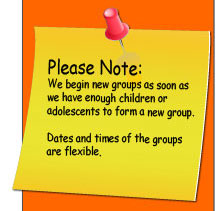| February-March 2010 - Volume 50 | |
| Helping Children and Adolescents Succeed Socially! | |
| The Social Skills Groups | Understanding Your Adopted Child |
|
How to Help Them to Make and Keep Friends. When supporting these children, yes addressing the adoptive family is so vitally important, but there are still the preverbal feelings and experience of separation, loss and abandonment that needs to be addressed with the suffering child. It needs to be talked about, and sensitively understood with the child and with the adoptive family. What we are dealing with are feelings of separation, loss, abandonment, rejection and trust. Every child is different and every child struggles differently. But adoption is not as simple as one may believe. The middle school group was about to begin...There were three kids in the group room anxiously waiting for the new girl to join them. One girl and two boys waited, while in the waiting room and all alone, sat the new (and an adopted) girl. She sat there, a frightened child and afraid to join them. And she would not budge. I sat down next to her in the waiting room; we sat quietly together. I joined “her world”. I also gave her as much time as she needed. I always consider where the kids are developmentally. Where should they be at in their age developmentally? (She was 12 years old.) But where are they actually developmentally in their behaviors and in their lives? I had mentioned to her mother in front of her, the week prior, that in 6th grade a child should have accomplished the tasks of the latency aged child. Latency aged children (6-12 years old); hopefully learn the feeling of success, whether in school, on the playground, academic or social. Latency aged children are moving away from Mom, Dad, and family, and making friendships. Yes, family is important still and as it always should be, but at latency ages, developmentally speaking, children are learning to be successful academically and socially, and they step away to do this, knowing well that Mom and Dad will be there when they return. Well… my words loomed in her mind since the day we first met (and for an entire week.) and became a huge worry and concern for her, “Moving away from Mom and Dad.” As we sat alone and together in the waiting room, she was able to tell me her worry. At that moment, that profound moment, I was able to get closer to what is not working for her and perhaps many other adopted children. The idea of separation, loss and abandonment from Mom and Dad is foremost in their minds. She told me that she does not want to step away from her Mom and her family. She does not want to separate from them. Therefore, (I thought to myself) how can she accomplish the task of making friends? Adoption has far reaching effects on your adopted child, your family and on their perspective in their life. Today it is understood by doctors and psychologists, that the bonding between mother and infant does not begin at birth, but is a continuum of the forty week gestation period inutero. This forty week pregnancy and evolution includes psychological, physiological and spiritual experiences. This process continues after birth, that is unless, it is interrupted by post natal separation of the biological mother. Abandonment and loss are forever marked on the preverbal minds of the infant and later these children from the separation at birth. We are learning that the separation has a profound effect on the children. It also has a profound effect on the biological mother (and father). This causes a primal wound. And the trauma is all preverbal. It comes before thoughts and ideas can be understood with words. According to (Verrier, 1993), an event from a person’s infancy can and will stay with them throughout life. What may and does happen is that, the child may re-experience (today in their lives) emotions felt during the preverbal trauma of separation without the child understanding what is occurring. This can lead to situations that present in the child’s days that feel the same as the period of separation at birth, and as if they were happening in the present. The child is often clueless of this transference experience. It just feels terrible to them without any understanding and perspective on their episode. As I sat there in the waiting room with this 6th grade child, my empathy for her was telling me that she was going through such an experience and it was clearly keeping her to herself, and not wanting to connect with the group kids, and with kids in general. Just by acknowledging her feelings, (and beginning to put words together for her feelings and confusions.), she was then able to join with me, and the kids in the group. I made sure I sat close in proximity to her, in order to keep our connection and our new understanding, and to offer comfort and support while she took a very big chance, and step, to meet the kids and the new friendships awaiting her. What can parents do to support their adopted child?
-- Susan Stern, LCSW is the founder of The Social Skills Place, Inc. Many ideas taken from Nancy Verrier, The Primal Wound: Understanding the Adopted child. 1993 |
| The Social Skills Place, Inc. :: 310 S. Happ Rd, Suite 201 :: Northfield, Illinois 60093 Office 847 446-7430 :: Cell 847 507-8834 :: www.socialskillsplace.com |
|
| (C) 2006-2021 :: All Rights Reserved :: Unsubscribe from our mailings |
